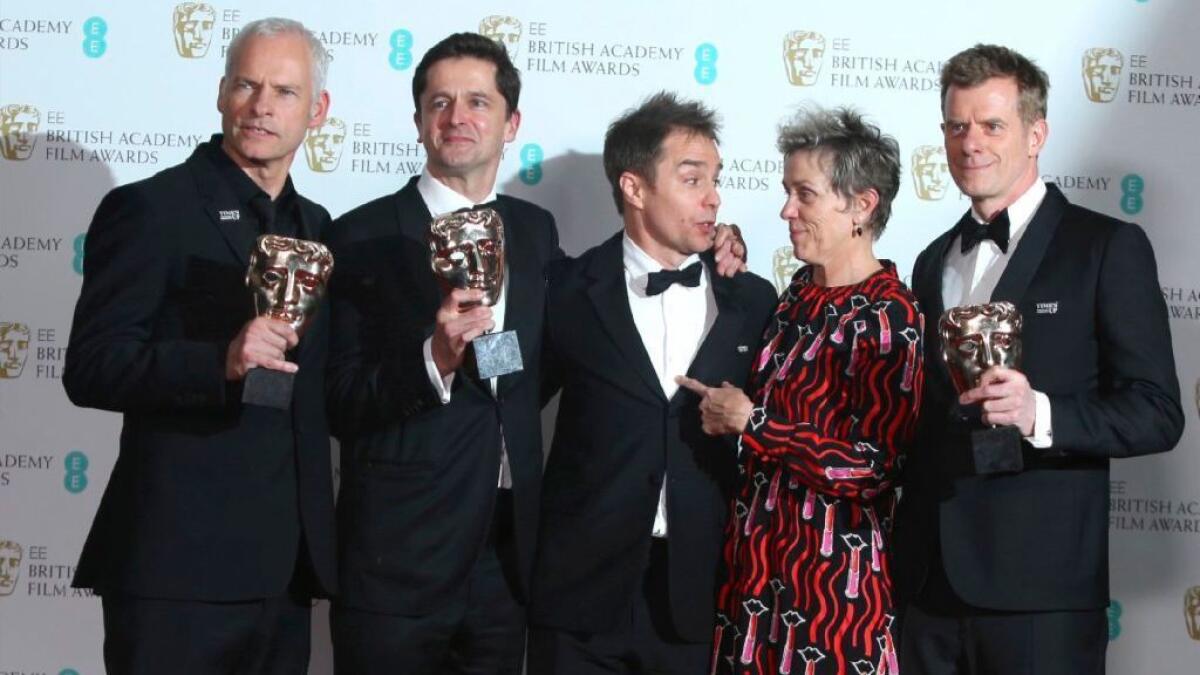BAFTA Awards celebrate achievement in film and solidarity with women

The energy of change was palpable Sunday evening at Royal Albert Hall as London celebrated the 71st BAFTA Awards. Nearly every attendee — nominees and voting members alike — wore black in collective solidarity with the Time’s Up movement, which seeks to end sexual misconduct in the entertainment industry and beyond. The awards ceremony followed the recent publication in the Observer of a letter signed by more than 190 British actresses calling for change, echoing the recent sentiments of Hollywood, particularly as seen at the Golden Globes.
The sentiment was underscored by Joanna Lumley, who as the ceremony’s first solo female host pointed out that exactly 100 years ago, the historic building had hosted the women of the British suffragette movement, whom she noted “laid the groundwork” for Time’s Up and led to this moment, which is about “the determination to eradicate the abuse of women the world over.”
Award winners stayed on topic as well.
British writer-director Martin McDonagh, whose film “Three Billboards Outside Ebbing, Missouri” took the best picture honor as well as the original screenplay prize, noted the timeliness of his movie in his acceptance speech. “It’s a film about a woman who refuses to take any ... anymore,” he said.
2018 BAFTA awards: Winners and nominees from the British Academy of Film and Television Arts »
The picture took home five awards, including for two of its actors, Frances McDormand and Sam Rockwell.
“I also stand on the shoulders of women,” Rockwell noted in accepting the supporting actor trophy, “strong, righteous, intelligent women.”
McDormand, who starred as a grieving mother who called out the town’s police force for not solving her daughter’s murder, took the lead actress prize and appeared onstage in a red patterned gown.
“I have a little trouble with compliance,” she said in accepting her award. “But I want you to know I stand in full solidarity with my sisters in black. I appreciate a well-organized act of solidarity.”
As much in the spotlight as any of the nominees, Kate Middleton, the Duchess of Cambridge, attended the ceremony with Prince William. In as much solidarity with the evening’s theme as protocol would allow, the duchess wore a dark forest green gown with a black sash. British royals are expected to remain impartial in most political matters, so her choice allowed Middleton to largely blend in with the sea of black without making a personal statement of support.
Other winners followed largely along predicted lines.
Guillermo del Toro won the director prize for his fantastical love story “The Shape of Water,” which went into the evening with 12 nominations but took home just three awards.
Gary Oldman won the lead actor award for his portrayal of Winston Churchill in Joe Wright’s “Darkest Hour” and was brought to tears during his acceptance speech. The British actor was visibly moved by the award, thanking his three sons, who were in the audience, as well as Churchill himself.
Allison Janney took the prize for supporting actress for her turn as the resentful and ungiving mother in the Tonya Harding story “I, Tonya.” James Ivory won the adapted screenplay award for “Call Me by Your Name,” giving something of a shoutout to his cast of Timothée Chalamet, Armie Hammer and Michael Stuhlbarg by acknowledging that “a film like this depends on a lot of people, but first of all it depends on the actors.”
“Coco,” the Disney-Pixar film celebrating family and the Day of the Dead tradition in Mexico, earned the award for animated feature. “Representation matters,” said director Lee Unkrich. “Marginalized people deserve to feel like they belong.” “I Am Not Your Negro,” an examination of the life and thoughts of James Baldwin from director Raoul Peck, won the top documentary prize. The film had been Oscar nominated last year.
While BAFTA shares a small overlap of its voters with the motion picture academy, its effect on Oscar voting is thought to be minimal. With the exception of the best picture prize, which is a tight Oscar race, most of Sunday night’s winners are expected to take home statuettes again at the Academy Awards on March 4.
Prince William, president of the British Academy of Film and Television Arts, presented the annual Fellowship Award, the highest accolade given by BAFTA, to director Ridley Scott. The prince handed the reins over to actor-director Kenneth Branagh, who called Scott “indisputably a master.” The director’s history of putting strong, complex female characters on-screen was evident throughout the clips displayed, earning him a standing ovation from the audience at Royal Albert Hall.
Early in the evening, BAFTA chair Jane Lush spoke to the crowd. “It is also important to acknowledge what a difficult year it’s been for our industry,” she said, noting that BAFTA had recently implemented new principles and guidelines on behavior. “This is a moment in history,” she added. “It should be a watershed, a catalyst for lifelong change... We at BAFTA want to lead the way.”
Lumley kept things supportive and celebratory all night, even in light of the important issues at play. She handed out compliments to the nominees and presenters, often forgoing a joke in favor of kindness. Her quips, when they arrived, were never mean-spirited. About Daniel Day-Lewis, nominated for his role as a fashion designer in “Phantom Thread,” she noted, “I know what you’re thinking and, yes, you’re right, he did make my dress tonight.”
More to Read
Only good movies
Get the Indie Focus newsletter, Mark Olsen's weekly guide to the world of cinema.
You may occasionally receive promotional content from the Los Angeles Times.






